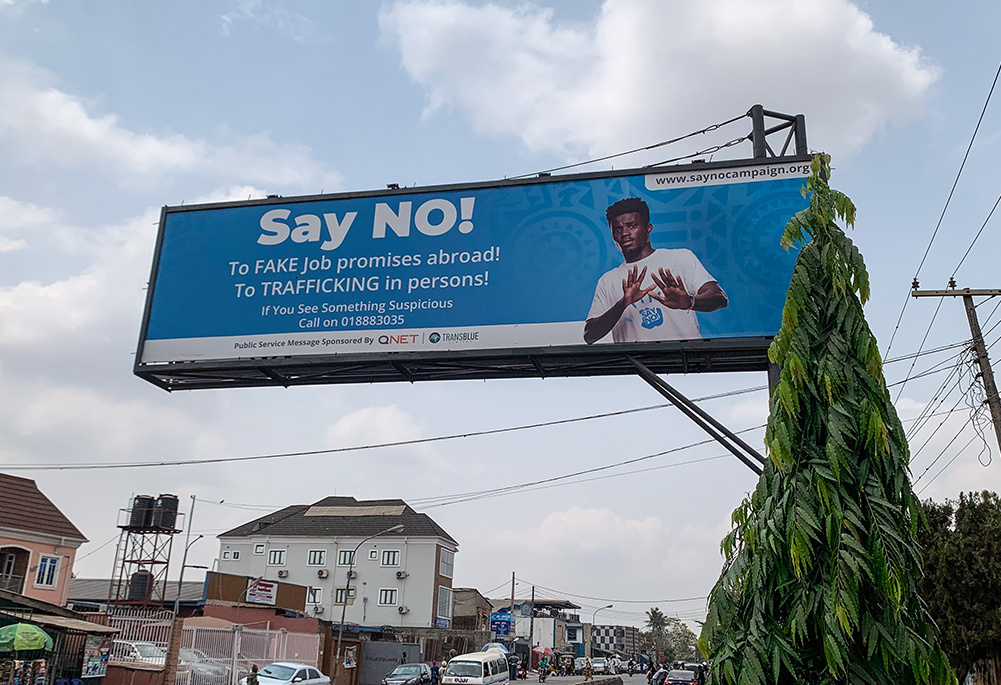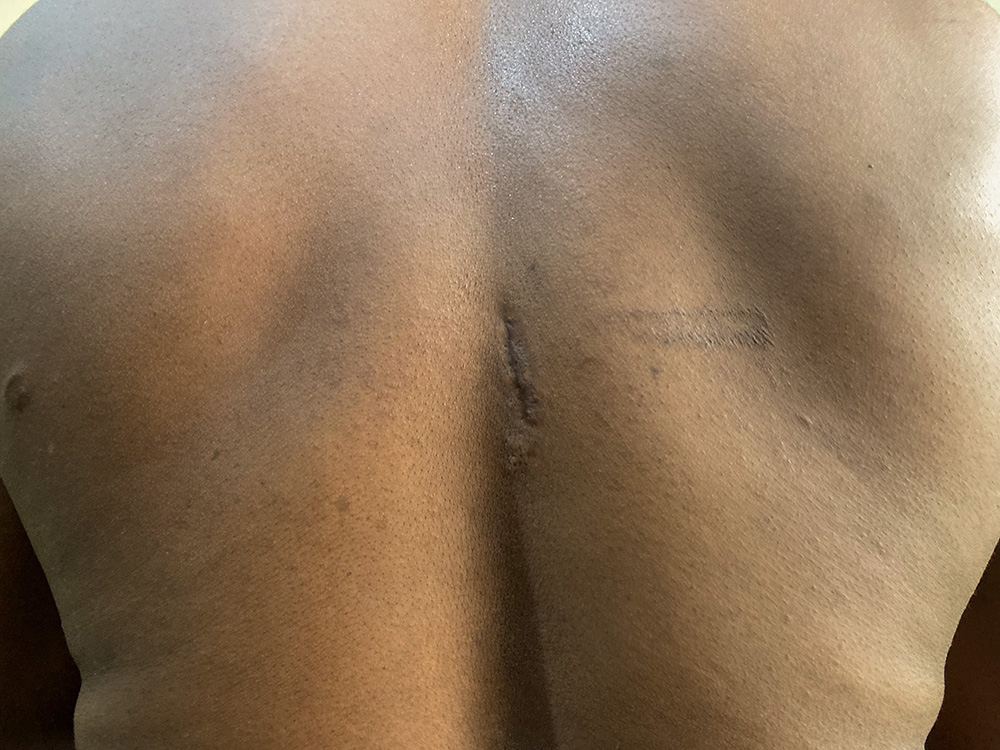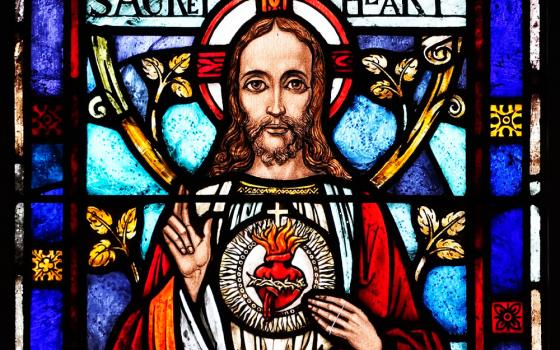
An anti-human trafficking billboard in Lagos, Nigeria, warns the public about fake job offers used by traffickers to lure members of the public into human trafficking. (Valentine Benjamin)
In September 2015, Benjamin Edowmonye started getting impatient with his self-employed auto mechanic work in Benin City, the capital and largest city of Edo State in southern Nigeria. He was struggling to meet living costs. It was a hard time as Nigeria's economy tumbled, with inflation at 9.2%.
He had only one thing on his mind: close down his workshop and migrate to Europe.
Benjamin set off with six other young men and their traffickers from Benin to Abuja, the national capital, in an 18-seater bus in November 2015. From there, they drove to Niger, where seven of them were crammed into a four-seater Volkswagen car — taking a popular route for migrants from West Africa.
"We got to Niger and drove through the Sahara Desert for nine days; we were transferred and stuffed into the back of a Hilux van until we arrived in Libya in December," he told NCR.
The appeal of Europe is widespread among young Nigerians, and Edowmonye, 30, was no different in his thinking.
Nigeria remains a source, transit and destination country for human trafficking, with 65% of the cases happening internally and 35% externally, according to the United Nations Office on Drugs and Crime.
The total number of persons trafficked outside of Nigeria remains largely unknown, but a 2021 report from the International Organization for Migration indicates that Nigerian migrants make up 6% of immigrants in Libya, where they are commonly traded in open markets.
Edowmonye was trafficked across the Sahara Desert to Libya where he says he was sold to an illegal gold mining network for $400.
Edo State, where he started his journey, is the epicenter of human trafficking in Nigeria.

Some of the scars on Benjamin Edowmonye's body. He says he was stabbed by his buyers in Libya when he revolted against their orders in Sabha, Libya. (Valentine Benjamin)
A number of Catholic organizations have now partnered to educate people in the area about the dangers of trafficking, and offer vocational skills. They include the Justice Development and Peace Centre in the Benin Archdiocese, the Bishops' Conference of Italy, the Salesians of Don Bosco, Jesuit Refugee Service, Caritas Nigeria and the Patriotic Citizen Initiatives group.
Fr. Benedict Onwugbenu, executive director of the Justice Development and Peace Centre, said people like Edowmonye can be enticed into taking dangerous migration routes with the hope of one day reaching Europe.
"People see it as an attractive and the only means to migrate, thereby giving human smugglers the opportunity to approach them with vague promises of a better life in Europe," said the priest.
"Parents also encourage their children to embark on such journeys without considering the dangers that come with it," he said. "Some even sell their lands to sponsor their children, they see their children as the only hope of survival, and when any of them refuses to go, they see that child as a curse on the family."
Onwugbenu said about 167 persons benefited from the Catholic initiative for skills acquisition, while 100 families were empowered with help for their small-scale businesses, in order for them to be able to take care of their children's needs.
Osita Osemene, executive director of the Patriotic Citizen Initiatives, told NCR that the menace of human trafficking can "only be minimized, but cannot be eradicated because our interventions are not as good as what the traffickers are doing. They are proactive in the ways they operate and have mafia-type organizations with strong connections in most destination countries."
"The news about their activities stopped because they have changed strategy. They have shifted to countries in Asia, trafficking young girls and using them for prostitution," said Osemene. "And that's because the spotlight has been beamed on their schemes along the Sahara Desert to Europe."
Advertisement
He says the partnerships among the Catholic organizations has helped bolster the level of awareness across communities in Edo state. "One of our key strengths is sensitization and we ... have been in strong partnerships with Catholic bodies, to provide skill acquisition and empowerment training for selected potential migrants and identified returned migrants."
The partnerships started in 2018. Between 2018 and 2021, the partnership says, it provided sensitization on the ills of irregular migration, strengthened the livelihood of most vulnerable households and improved access to education and vocational training through provision of block grants and scholarships, and safe accommodation for vulnerable children and victims of human trafficking.
The group also says it has trained hundreds of youths with sensitization against sex trafficking, and has rehabilitated and empowered more than 300 youths with skills in — and startup tools for — tailoring, makeup artistry, hair styling, being a machine mechanic, welding, tiling, shoemaking, phone repair and electrical installation.
In 2022, Benin City Archbishop Augustine Obiora Akubeze sponsored funding for the training of 170 young people in makeup artistry, catering, information and communications technology, hair styling and tailoring.
The Justice Development and Peace Centre is also working with the National Agency for the Prohibition of Trafficking in Persons — a government agency established to arrest and prosecute trafficking offenders.
Onwugbenu said that in some of the communities they help, the partnership's efforts get stiff resistance from parents and individuals who feel uncomfortable about their campaigns. He said reducing the menace of irregular migration in Edo state requires rigorous sensitization with individuals and government support.
Edowmonye returned to Nigeria in 2018 after spending nearly three years in Libya, and has continued with his auto mechanic work.
Between April 2017 and February 2022, both local and international media reported the safe return of 19,452 Nigerian migrants from Libya through the assistance of the International Organization for Migration, a U.N. agency.
An estimated 150,000 people crossed the harsh and arid desert zone in northeastern Niger to Europe in 2015 alone, according to Oxfam International. Between January 2014 and October 2023, more than 13,600 migrants on transit routes across the Sahara Desert and on the maritime route from West Africa were reported to have died.








